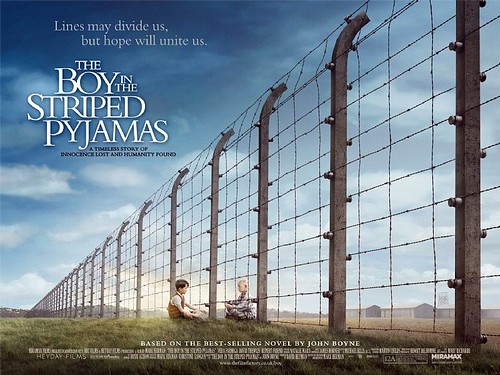 More of a Greek tragedy than anything to grace the silver screen in a while, The Boy In the Striped Pajamas is a poignant look inside the emotionally tumultuous lives of the family of an SS officer during WWII as viewed through the eyes of an 8 year old boy.
More of a Greek tragedy than anything to grace the silver screen in a while, The Boy In the Striped Pajamas is a poignant look inside the emotionally tumultuous lives of the family of an SS officer during WWII as viewed through the eyes of an 8 year old boy.The film opens on a group of young kids playing at an aerial dog fight in the streets of Berlin. One of them is Bruno (Asa Butterfield), the son of the above mentioned Officer played by David Thewlis. He comes home to find that his father has received a promotion and that there is to be a party to celebrate later that evening and that they are soon going to leave the city as the promotion comes with reassignment to a rural location. When they arrive we realize that it is the running of a concentration camp that Thewlis his been charged with but he and his wife (Vera Farmiga) try to keep this from the young boy. As the child tries to make sense of the new situation he finds himself in and to alleviate his boredom he sneaks out of the house and through the woods to the edge of the camp where he befriends Shmuel, a small boy of the same age who is hiding in a corner of the camp on the other side of an electrified fence. They grow to become friends although there is a disconnect in their experiences. Bruno, fed by childhood innocence, propaganda films, a strict nationalist tutor and the blind love of his father believes that the people in the camp are living a life of hard but enjoyable work while the horror of the place, written all over Shmuel face, cannot be adequately conveyed to his friend by his young mind. Bruno is forced to grow up quickly in this environment even to the point of questioning the goodness of his own father, especially after his mother finds out the true secret of “The Final Solution” and deteriorates into an almost catatonic state.
Mark Herman’s film is as stark in its set design as in its affecting story line with a haunting quality that constantly unnerves the audience. Based on John Boyne’s novel of the same name, the story takes quite a few liberties with historical accuracy but due to the power of material, much like the Bruno himself, we look on with a child’s eyes totally engrossed in the tale being told. And not one of those eyes is dry when the film reaches its ultimate climax where the eerily calm home life of Bruno is finally contrasted with the frenzied confusion and shocking conditions of life inside camp and Bruno see for the first time what has been hidden from him. This is not a Disneyfied fairy tale like The Kite Runner or a piece of life affirming Oscar bait but a profound tragedy that will leave you in solemn silence but with an appreciation for the brave talent who decided that this is a tale that should be told.
A
2 comments:
Is it wrong that I saw the screencap of the blonde washing his car and thought, "Hot nazi"?
Is it wrong that when I realized the clip was about serious stuff, I thought, "More hot nazis. Less suck"?
At least yr not having these wrong thoughts about the second clip.
Post a Comment